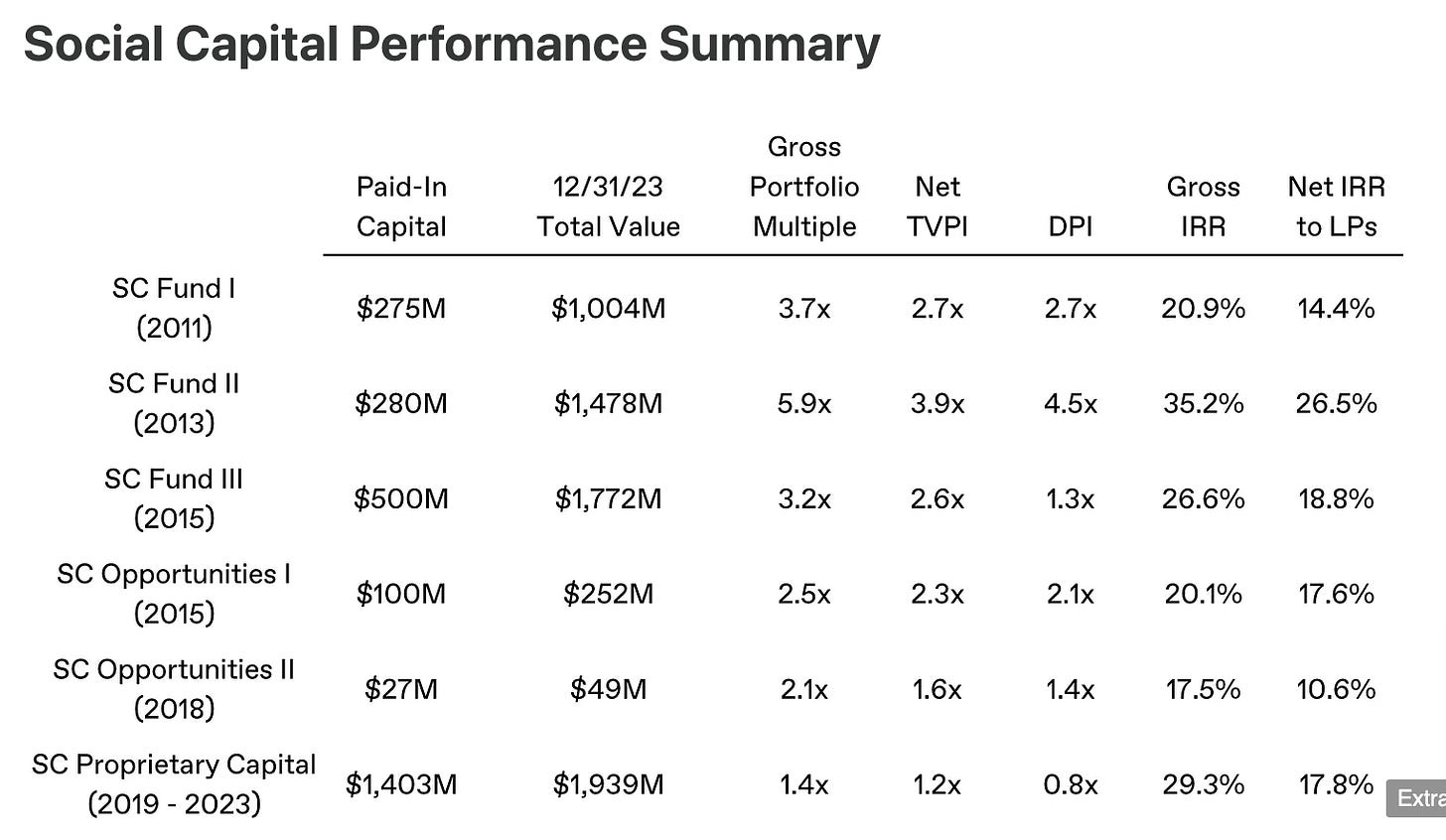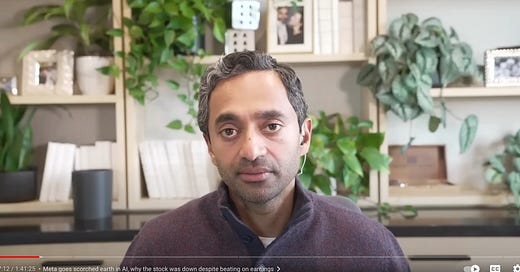'The Dictator': Chamath Palihapitiya's Broken Professional Relationships
The inside story on Social Capital's two big breakups
In late 2020, Chamath Palihapitiya — the dictator, as he is known on the All-In Podcast — bought a Bombardier Global 7500 private jet for $75 million just as he was was hawking SPACs on CNBC.
At the time, it looked like the man who had made a fortune on Facebook’s public offering, who built his own lucrative venture capital firm, and who co-hosts one of the most popular business podcasts in the world was only going to climb to greater heights.
Money would keep flowing in endlessly.
And indeed, Palihapitiya has said his company made roughly $750 million from the SPAC frenzy by taking hefty promote fees for taking companies public in SPAC mergers.
But there are signs that Palihapitiya’s fortunes have dimmed since he served as the face of the SPAC debacle.
I’ve spoken to former Social Capital employees and dug into Palihapitiya’s investments. I can’t say I’ve listened to every episode of the All-In Podcast, but I’ve consumed more episodes than I would have liked. I’ve unearthed new information about Palihapitiya’s two professional breakups at Social Capital and have gotten a picture of how the luster of the once rising star venture capitalist has faded.
For one, almost everyone has left Palihapitiya’s venture capital firm, Social Capital. Sources tell me that the firm’s chief financial officer and general counsel have both resigned.
Palihapitiya had tried to raise a new venture capital fund from outside limited partners for the first time in many years — which would have generated fees, instead of just investing his own capital — but abandoned the effort last year.
Palihapitiya has invested many millions of dollars into Clover Health (down 90% since going public), ProKidney Corp (down 59%), and Akili (down 96%). Together the losses have likely climbed into the nine figures.
Palihapitiya’s Social Capital made a reportedly $220 million investment in Palmetto Clean Technology.
Forbes doesn’t seem to have called him a billionaire since the SPAC frenzy in 2021. It seems highly unlikely that he is one. (To be sure, Palihapitiya is almost still certainly very wealthy by any normal standard. And his challenges may mostly amount to liquidity problems given that much of his wealth is tied up in private investments.)
Palihapitiya has openly discussed his belt-tightening on the All-In Podcast.
In January 2023, he talked about looking at his household spending. “I haven’t really looked at my household budget in 2 or 3 years — didn’t even bother. Then when I looked at it, I was like wow this is really inflated to a level I didn’t even expect. It makes a lot of sense to live in a more heads down, austere way.”
In June, he said on the podcast that he “flew public” by taking Southwest Airlines.
I’ve learned that last year Palihapitiya quietly sold his expensive private jet.
His public letter to investors last year called this an “age of austerity.”
Some of Palihapitiya’s critics believe that this string of setbacks could partially explain his decision to drive every other investor and most employees from Social Capital, the firm he co-founded.
There’s money to be made still off of Social Capital’s first three venture capital funds, backed by outside limited partners. The firm’s carry is zero-sum — the less other partners take, the more that’s left for Palihapitiya.

Mamoon Hamid’s investments in Slack and Intercom, in particular, are big drivers of the fund. Hamid also incubated Netskope, which has been valued at $7.5 billion on the private markets. An investment in Swarm, led by Jay Zaveri, has also fared well after SpaceX acquired it. Social Capital sold its position in a secondary for a big windfall. Palihapitiya led a successful investment in the crypto company DCG and he incubated the AI company Groq that could prove to be another winner for the firm.
While those funds have basically run out of money to make investments, Social Capital is still collecting management fees and the firm will generate carry as its portfolio companies have exits. (Sources tell me that Palihapitiya asked his limited partners in October to increase the firm’s management fees but the request has not been approved.)
With Palihapitiya, there seems to be a pattern of a lack of loyalty to core lieutenants. This is the man I called “The Scam in the Arena” the last time I wrote about him.
But things are worse than I knew then.
I sent Palihapitiya and his spokesperson a detailed fact-checking email. Neither replied. I also texted Palihapitiya and he didn’t respond. I met Palihapitiya early in my time reporting on Silicon Valley. I profiled him in this newsletter in 2020 as the SPAC craze was ramping up.
In his latest investor letter published this week, Palihapitiya wrote, “While 2023 was full of challenges, we are near the end of the hard reset from zero interest rates. After a decade of low rates and rising valuations, many of the tailwinds that benefited us as technologists are now gone. Instead, disruptive change via advancements in AI and reshoring of critical industries are reshaping how companies are built.”
There have been two rounds of major breakups at Social Capital.
Hamid & Maidenberg’s Arbitration Fight
In 2017 Social Capital’s co-founders Hamid and Ted Maidenberg fell out with Palihapitiya. Hamid left to help run Kleiner Perkins. And Maidenberg was pushed out by Palihapitiya. (Maidenberg went on to co-found Tribe Capital.)
As Hamid, Maidenberg, and others were leaving Social Capital, Palihapitiya retroactively capped how much carry they could receive from their investments during their time at the firm, people familiar with the matter tell me.
Even though partners had vested, Palihapitiya limited how much upside they could receive. One source put the total amount of money at stake in excess of $50 million.
Hamid and Maidenberg fought Palihapitiya in private arbitration on behalf of themselves and other people who had left Social Capital.
I’ve learned that Hamid and Maidenberg lost their fight with Palihapitiya last year.
A lawyer for Palihapitiya’s Social Capital bragged on his law firm’s website that he had “[s]ecured complete victory for a Silicon Valley venture capital firm Social + Capital in proceedings brought by two of its founders and a former partner alleging improper dilution of their carried interest. Following a week-long arbitration trial and post-trial briefing, a JAMS arbitration panel found in favor of Social + Capital in all respects and dismissed all claims asserted by the claimants.”
The arbitration panel found that Palihapitiya had wide latitude under the firm’s limited partner agreement to amend employees’ compensation, a source tells me.
I’m told that his August 2023 post — “I’m in the arena trying stuff. Some will work, some won’t. But always learning” — came soon after his arbitration victory against Hamid and Maidenberg.
The Groq SPV Freakout
More recently, Palihapitiya fired Social Capital partners Zaveri and Ravi Tanuku.
Palihapitiya took issue with a special purpose vehicle that allowed Social Capital employees to invest in the promising AI startup Groq. The purported issue seemed to be that the employees were cutting the fund out of a potential deal — but sources told me that Palihapitiya had been briefed on the Groq special purpose vehicle.
Palihapitiya posted cryptically on X on March 12, “We have terminated the employment of two of our employees due to employee-specific circumstances. We have no further comments at this time.”
He hired the law firm Wachtell to look into issues at the firm — though it’s not clear what the law firm found or how thorough their investigation was.
Some former Social Capital employees believe the employees’ Groq SPV was a pretext for Palihapitiya to again deny carried interest to his employees. Palihapitiya still seems to be negotiating with his former lieutenants.
During one All-In Podcast episode Palihapitiya revealed how he handles problems with employees. “There is no company where I have majority control where I have an HR department,” he said. “You should go to a very respected lawyer at a third party firm…and you should work with that law firm and retain them so that you have an escape valve if there are any kind of serious issues that need to be escalated.”
I’ve been told that even Social Capital’s general counsel Robert Goldstein participated in the SPV, leaving employees to believe that it was kosher.
In the latest turn at Social Capital, I’ve learned that both Goldstein and CFO Connor Nowinski have resigned.





